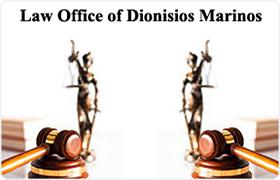Santa Monica Adoption Lawyer, California
Sponsored Law Firm
-
 x
x

Click For More Info:
-
Law Office of Dionisios Marinos
5150 E Pacific Coast Hwy Suite 200 Long Beach, CA 90804» view mapDivorce & Family Law Committed To Client Satisfaction
Don't hesitate to call the Law Office of Dionisios Marinos in Long Beach, CA. We are committed to your satisfaction. Call us today.
800-846-1250
Monica Ariel Mihell
Child Support, Adoption, Corporate, Business Organization
Status: In Good Standing
Margaret C Brewer
Landlord-Tenant, Family Law, Adoption, Corporate
Status: Inactive Licensed: 22 Years
 Dionisios Marinos Long Beach, CA
Dionisios Marinos Long Beach, CA Practice AreasExpertise
Practice AreasExpertise
